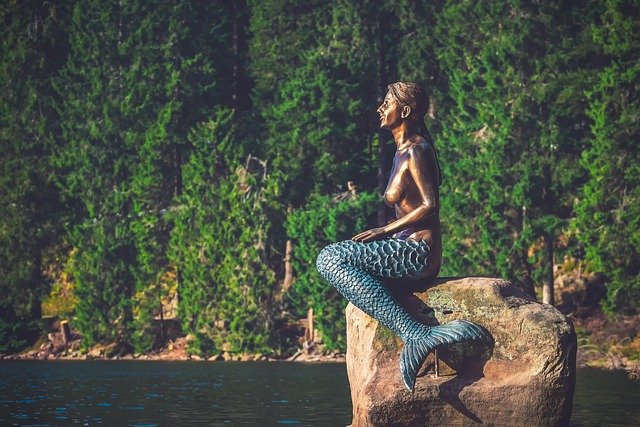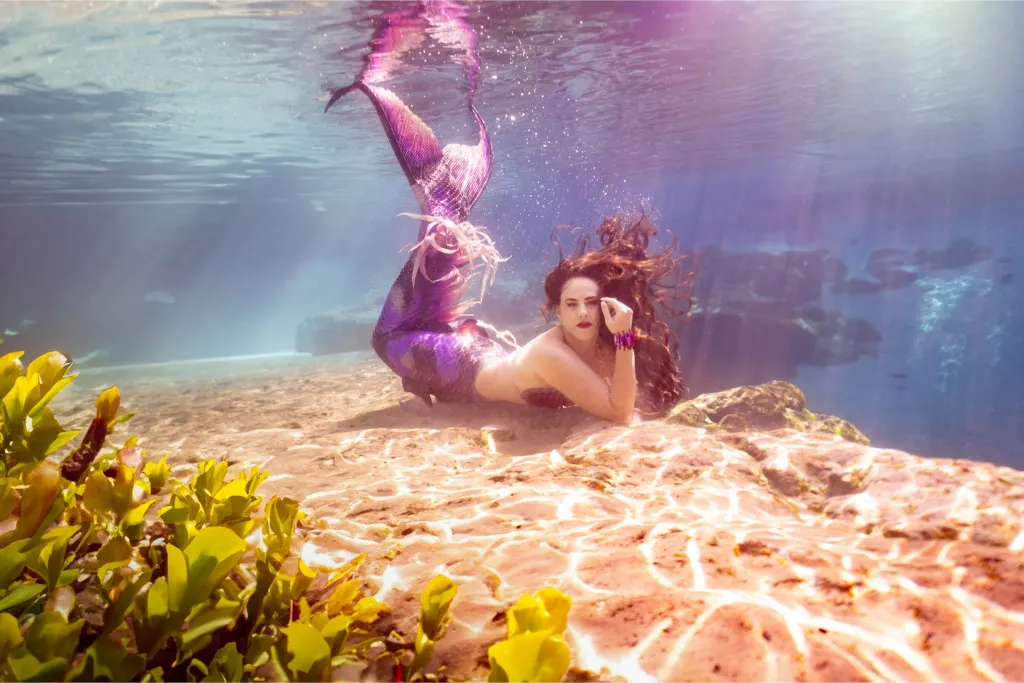
Underwater Modeling is fun, alluring and captivating. Whether it’s for a music video, a commercial campaign, a film scene, or a fashion editorial in a pool, these projects are visually stunning and can evoke emotion in your audience. However, they also come with unique challenges you don’t face on land.
As a real-life mermaid and professional underwater model, I’ve learned the hard way (and the smart way) what makes a shoot successful for both the model and the production team.
If you’re planning an underwater shoot or hoping to book one, please read this first. It is filled with tips and tricks I have learned over the years and could save you from a lot of heartache during your next production.
For Models: How to Prepare for an Underwater Shoot Like a Pro
Let’s say you booked a job that calls for underwater modeling of some sort. That’s awesome, congratulations! Let’s talk about a few key details before the shooting date arrives.
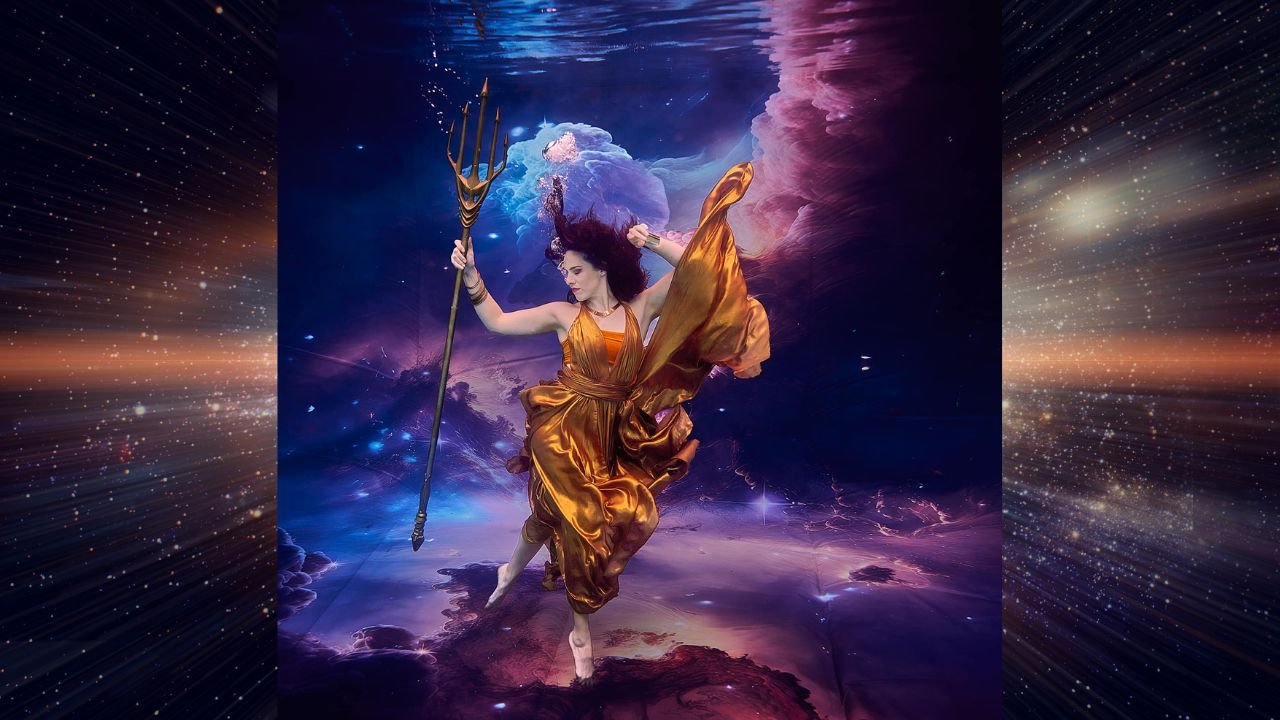
1. Be 100% Honest About Your Comfort Level in the Water
You must feel confident in the water. Period.
If you have any hesitation whatsoever – whether it’s about diving, holding your breath, seeing underwater, location, or even your swimming ability, please tell your photographer or director ahead of time.
Don’t try to “be a hero” and push through discomfort. It will show in your body, your face, and your performance. Even worse, it can put you in danger and slow down the production, which is the last thing anyone wants.
Be transparent. Let them know what you can and can’t do.
Be collaborative. If you’re not the right fit, recommend another model who is. I will always recommend this for any performance. Whether it is for underwater modeling (maybe I got sick and couldn’t make the dive), or voiceovers (maybe a client of mine is looking for a Spanish voice talent), you get the picture.
All in all, just try to be as helpful as possible. This builds trust and professionalism. They will also love you for the help and recommendation.
2. Know Your Body and When to Call It
Wanting to give 100% is admirable, but underwater, it can become dangerous fast.
Things to be aware of:
- Hypothermia
- Exhaustion
- Strong currents
- Hair or wardrobe entanglement
- Limited breath-hold time
- Unexpected marine life interactions
If you get cold, tired, or panicked, please speak up. There is no “toughing it out” underwater. There is only clear communication, or someone gets hurt.
Always:
- Listen to your body.
- Speak your limits.
- Stay mentally sharp.
You are a professional. Know where your limits are and respect them. The consequences are not worth it.
Also, be sure to look out for other people on set. Know what to look out for and speak up for others if they don’t have the courage to do it themselves. (I will be first to admit that I have done this and it paid off. The production team was thankful and so was the model!
3. Stay Warm, Stay Ready
Even in heated pools or warm oceans, the human body cools quickly when submerged for long periods. So be sure to bring:
- A warm beverage (tea, broth, or water with electrolytes)
- A cozy robe or parka
- Wool socks, gloves, and a hat
- An emergency blanket or body wrap
- Anything else that will keep you warm and cozy before, during and after the perfromance.
Warmth = endurance = better performance.
Production teams should build warm-up time into the schedule. Not just for comfort, but for safety.
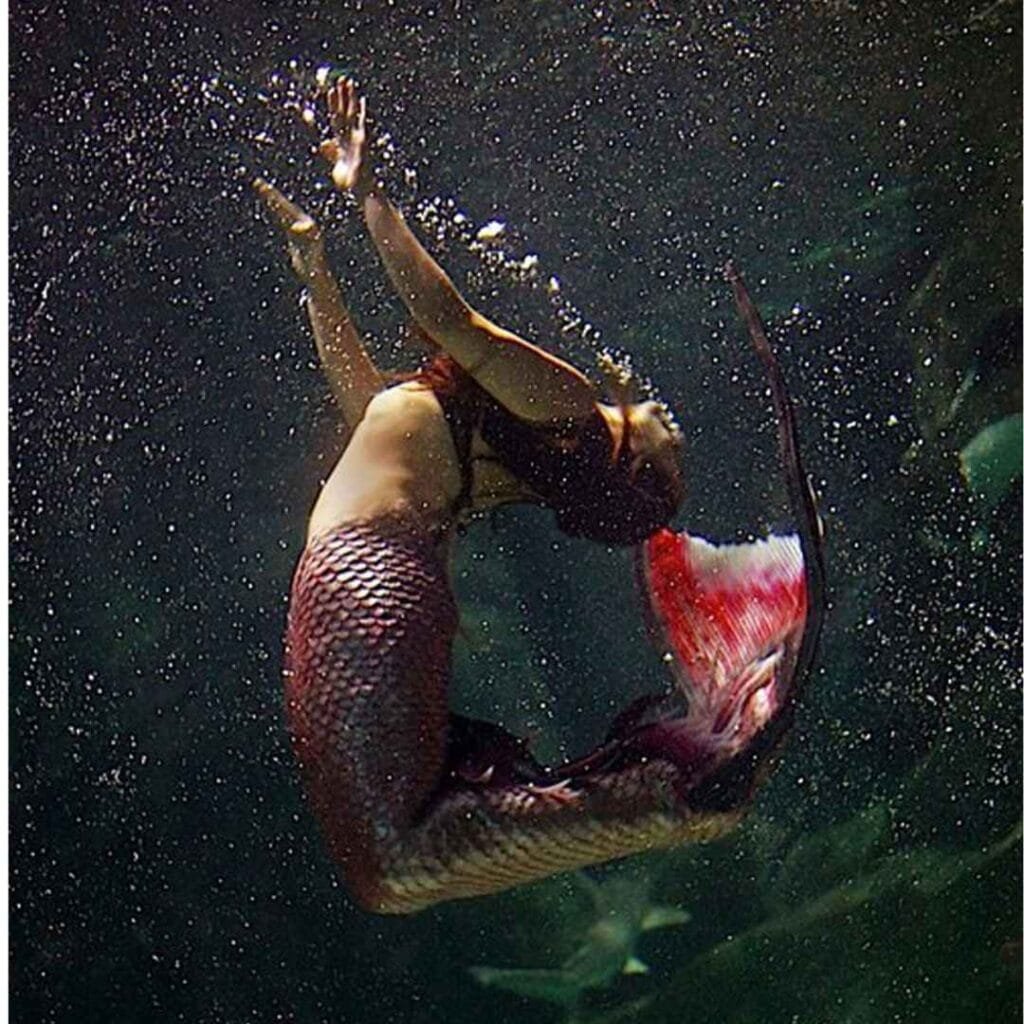
4. Don’t Panic. Ever.
When something goes wrong underwater (and sometimes it will), the best thing you can do is: stay calm.
Panic elevates your heart rate, burns your oxygen, clouds your thinking, and shortens the time you have to respond.
If your dress gets tangled, you bump into a big sea creature, or something unexpected happens:
- Stop.
- Think.
- Signal your safety diver.
- Surface slowly and safely.
Calmness is a core skill in underwater modeling. It keeps you safe and keeps production rolling smoothly. The last thing I want to do is scare you, but things can and will go wrong. Because of that, you have to be ready for anything – especially when you are modeling underwater.
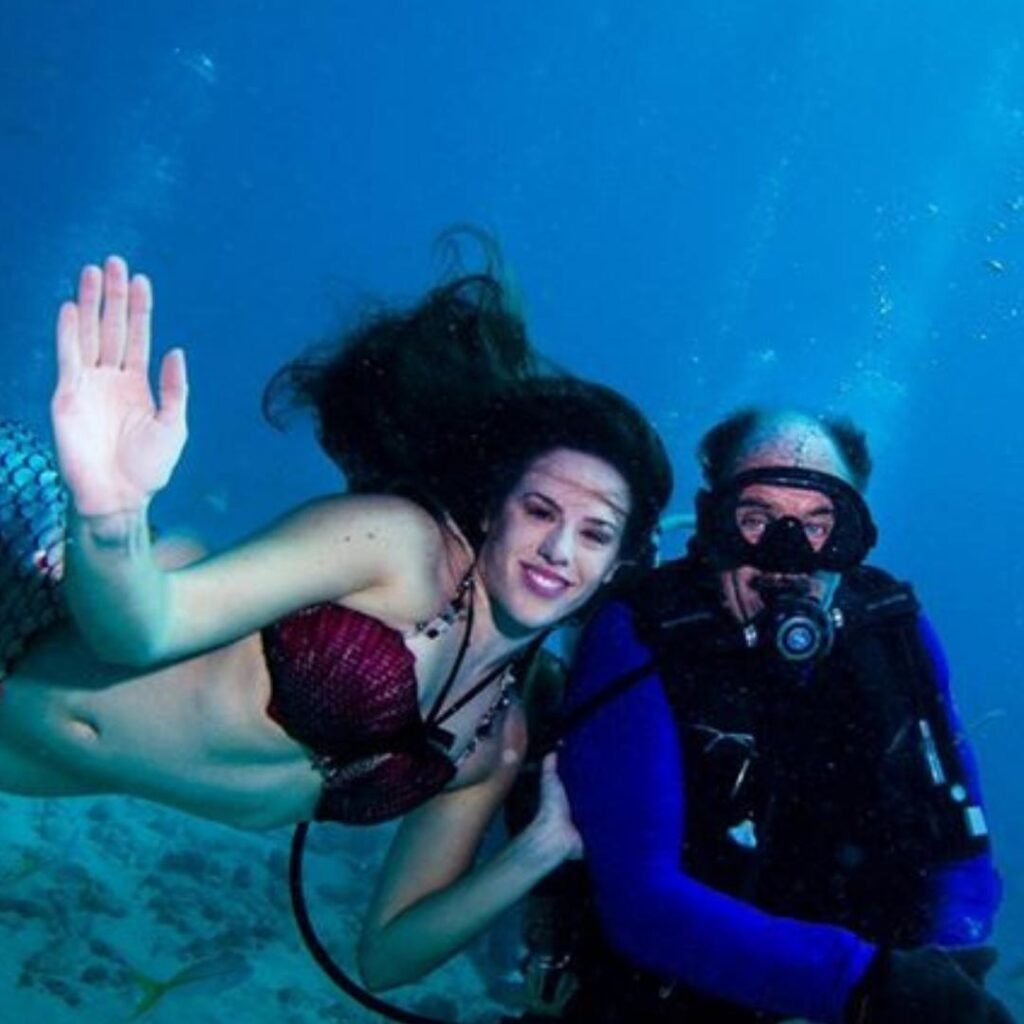
5. Always Have a Safety Diver (or Two)
This is not optional. It’s not a luxury. It’s not “something we’ll skip to save money.”
It’s a life-saving standard.
As a working underwater model, I can’t stress this enough: a safety diver may be the only person who notices if something goes wrong.
They are trained to:
- Monitor your depth and safety
- Respond to signs of distress
- Help with wardrobe tangles
- Guide you to the surface if you’re disoriented
Production teams: budget for this. Models: ask for it.
It’s not dramatic, it’s professional.
For Production Teams: How to Support a Safe and Stunning Underwater Shoot
If you’re producing a scene with underwater talent, the goal is to get breathtaking footage without putting anyone at risk. Here’s how to set your team and your talent up for success.
1. Hire the Right Talent (Not Just the Prettiest Option)
Not every model with a beautiful portfolio is ready for underwater work. I have worked with some stunning models who couldn’t handle the elements in the springs during shoots.
Look for someone who:
- Is comfortable diving and holding their breath
- Knows how to pose gracefully underwater
- Can manage wardrobe, hair, and facial expressions in water
- Knows their physical limits and communicates clearly
Need help casting? Hire a professional underwater model or ask one (like me) to help you find the right person.
Not every underwater talent / mermaid for hire is the same, and you want to be confident you’re choosing someone who will be able to fully deliver the results you’re searching for.
2. Brief the Team Thoroughly
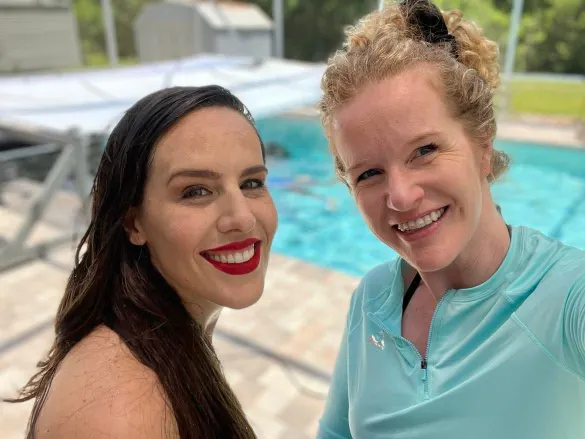
Before anyone gets wet, everyone should know:
- The exact movements, emotions, and timing of the shot
- Safety signals and dive protocols
- What to do in case of emergency
Communication is always key. Try to communicate the look and feel you are going for with your model before they submerge in the water. You can also plan to have a dry run on land first. Every bit of preparation matters.
3. Warmth + Safety = Better Results
Build in time and budget for:
- Warm drinks and food (Tea is my top choice, but hot cocoa and coffee will also work). Anything to warm up the model’s core temperature. Keep granola bars, bananas, and other food handy as well.
- Extra towels, robes, blankets (regular and emergency)
- Cover from the wind
- A safety diver or spotter
Don’t assume the model will “be fine.” That mindset leads to delays, poor results, or worse.

4. Respect the Water
Whether you’re in a pool, ocean, tank, or spring, respect the environment.
- Check currents and weather.
- Know what marine life may be present.
- Scout for hazards.
- Don’t over-schedule or over-shoot.
Everyone’s safety and stamina is tied to how well you prepare the environment.
5. Have Fun & Trust The Talent
Now the tough part’s over. You have your talent and can rest easy knowing you are
Final Thoughts and Reflections
Underwater modeling is both beautiful and bold, but it’s also demanding and holds high-stakes.
When models are well-prepared and honest, and production teams are thoughtful and safety-focused, the results are absolutely magical.
If you’re looking for a seasoned underwater model who can help guide your project to success, I’d love to hear from you.
📩 Contact Shannon
📍 Based in Central Florida — Passport ready & available for travel
Professional Underwater Model Shannon Scott modeling for the Water Bear Photography Workshop
Models, Stay Tuned: Mermaid Modeling Retreats Coming Soon
Want to learn the art of underwater modeling in a safe, supportive, and stunning environment?
Ready to break free of the borning, everyday life and do something to unleash your inner child?
Subscribe to the Bright Stars Greenroom newsletter to be the first to hear about upcoming Mermaid Modeling Retreats – where we train, create, and explore what it means to be powerful and graceful beneath the surface!
Let’s make magic, underwater.
